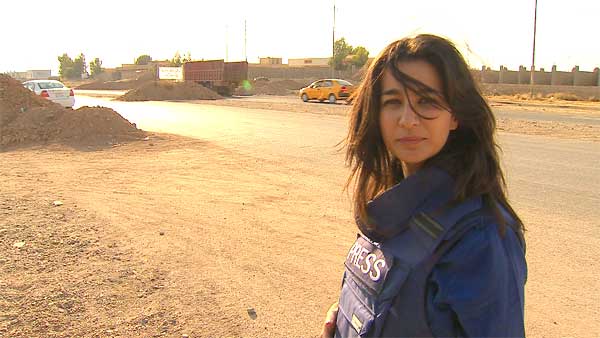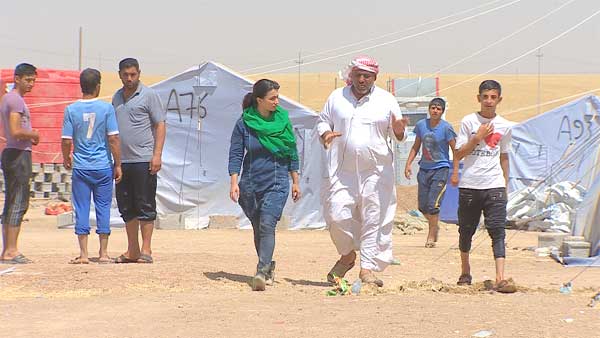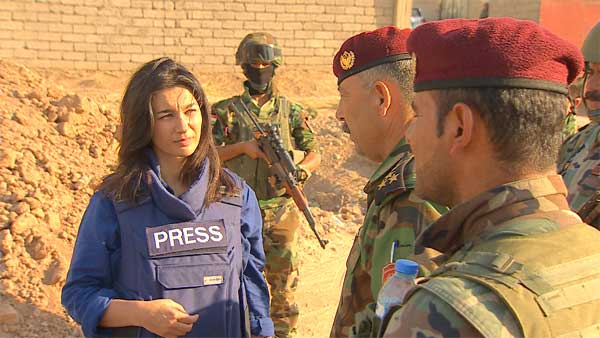It was only last year that I watched a group of Iraqi paragliders fly through the morning spring air, with their brightly coloured sails. They soared more than a thousand feet above the take-off point, much to the delight of families enjoying their Friday picnic below, a break from restive Mosul.
“When you fly you forget everything bad…you’re free.” She told me.
The leader of the 200 strong paragliding group was Captain Seba Yasin, a 50-year-old former Iraqi air force pilot who lost his left pinky to a propeller, told me flying was in his blood.
“When I was a little boy, I used to build little paper planes. The walls in my room were filled with pictures and drawings of planes,” his eyes lighting up as he recalled his childhood.
His oldest son Yasin, was one of the most talented paragliders and hoped to follow in his father’s footsteps. The somewhat over-confident 19-year-old was very proud of his hometown, Mosul.
“The world does not see Mosul as it is, the world sees it from the perspective of terrorism, security and destruction. They don’t see how loving and educated the people are.”
Alongside Ghada, there were 17 other female paragliders, including Dr Nawal. A devout Christian, she was the most experienced and had been flying longer than Captain Seba.
“I remember the days when we would go to Mosul in our flying suits! No one would say anything. Before the fall of Baghdad, we had a lot of freedom, especially the Christians,” she told me.
Even before the takeover by ISIS, Mosul had become the headquarters for Al Qaeda in Iraq, with daily car bombings and assassinations. But I had gone to Iraq to tell a different story for BBC World News’ Our World programme.
It was a story of ordinary people, who were trying to escape the horrors of daily life. I met Sunnis, Shias and Christians, all with one thing in common – paragliding.
As if life wasn’t dangerous enough for them, the members of the Falcon Aviation Club were choosing to jump off the side of a mountain with a paraglide strapped to their backs. And despite the increasing insecurity and instability they faced, they were determined to keep their dreams alive.
Meeting these daredevils and seeing them paraglide, was the last thing I expected to find in Iraq. After spending some time with them, I left the country feeling optimistic about Iraq’s future.
Just over 12 months after I met Ghada, Captain Seba, Yasin and Dr Nawal, I watched in disbelief as news broke that Iraq’s second largest city had fallen to an army of Sunni Islamic militants.
ISIS – the Islamic State of Iraq and the Levant – stunned the world as armed insurgents drove through Mosul in white SUV pick-up trucks, waving black flags in the air and claiming they had come to liberate the people.
They declared the city as their base for a new Islamic State, or Caliphate.
Now, as images of a violent extremist group played over and over again on my television screen, I feared the dreams of the people I’d met had been shattered.
Mosul had become the centre of the battle for Iraq. But what had happened to Ghada? And the other paragliders? Were they suffering under the brutality of ISIS? Had they fled?
Only a few weeks after the ISIS takeover, I returned to Iraq, to try and find them. Only by being there, talking to the people, seeing their experience and breathing in the dust could I really understand how much had changed for the optimistic group I met only a year ago.

Obviously, given ISIS’s sentiments towards foreign journalists and their past record in Syria, it wouldn’t be safe for me to enter Mosul this time. Even when I visited last year, despite not controlling the city, ISIS were a presence.
The situation was tense: an unhappy Sunni population was controlled by Baghdad’s Shia dominated central government and army.
The then Governor, Atheel al-Nujaifi, a Sunni, warned me that if big changes weren’t made by the Maliki Government, the situation could explode.
And so, now it seemed that it had. I, along with many other international reporters based ourselves in the relative safety of Irbil, in the semi-autonomous region of Kurdistan – just 40 minutes’ drive away from ISIS controlled territory.
Even though Irbil is not actually the frontline, I expected to find a city on edge, with at least some sign of concern for the war taking place on its doorstep.
Instead, it was thriving, with people enjoying themselves in the parks, shopping at the modern malls, and I could see even more construction sites than when I last visited.
The only sign that all was not well were the petrol queues where people waited for hours, sometimes days… stockpiling petrol, a clear expression of the fear that things might deteriorate in Irbil.
If anything, it felt as though this unexpected takeover of Mosul by ISIS, was something the Kurds could turn to their advantage. The ISIS sweep across Iraq, and the talk of partition, had made the dream of a fully independent Kurdish State seem closer than ever before.
From my base in Irbil, I set out to make contact with my paragliding friends from Mosul.
Through Facebook, I found Ghada. But just as I couldn’t get into Mosul, she couldn’t get out.
When I first met Ghada, she was a strong, positive and determined woman. Flying had given her life purpose.
After numerous attempts, we manage to speak on the phone. I had so many questions. First of all, was she safe?
“There’s nothing violent here in Mosul, it’s ok. We don’t have any bombing but we can’t say it’s a safe place.”
But the woman I had met, a woman who had big dreams, had changed. What are your dreams now? I asked.
“For me, everything in my country now is not safe, not peaceful. As for my dreams I don’t have any now, I just want peace and dignity”.
Without petrol or electricity, Ghada can’t leave her house and life is getting harder. But she told me she would not leave.
What if the situation gets very bad? I ask. She answers with a spark of her old spirit
“I will stay; It’s just like flying, when we fly, we don’t know how we are going to land, so we take a risk and we’ll see what God give us.”
I hung up, glad to have heard her voice, but wondering how bad the situation would get for her. After all, ISIS flaunt their brutality. In fact, they seem to revel in it.
Their greatest weapon? Fear spread by social media. Before coming to Iraq, I had watched videos of ISIS apparently rounding up hundreds of men from the Iraqi army and beheading them. I saw images that appeared to show a man being forced to dig his own grave.
The Islamists use this powerful tool to spread their message of hate and make clear the terrible fate that will befall their opponents.
And despite knowing that I couldn’t reach the centre of Mosul, I wanted to travel the road to the city as far as I could, to find out how many people were leaving, and how many people were going back; what did the frontline actually look like? And how were the refugees faring who were scattered along the road?
We travelled for 30 minutes along the road towards Mosul to reach the first checkpoint, Kalak. As we approached it, I noticed at least eight Kurdish soldiers, all armed with AK-47s, cleanly shaven and alert.
At this point, I feel reassured by their presence. These guards are not the aggressors, they’re defending the city.
After a brief conversation, we sailed through. Just past the checkpoint, on the side of the barren hills, is where the UN’s refugee agency, the UNHCR have set up their white tent encampment, in the searing heat which easily reached 50 degrees Celsius. This is what hundreds of Mosulis are now calling home – unsure when they might return.
In one tent I met Mohammad, 37, a soldier who had defected from the Iraqi army. Surrounded by five of his children all below the age of seven, he recounted how ISIS came to his army base.
“When I saw them, I thought I was a dead man. But then they told me, ‘If you promise to leave the army we won’t kill you and you’ll be free to go’. They’re men of principle and stuck to their words. That’s why I’m alive today.”
In another tent, I met Faisal who had fled with his family from Saladin, a village on the outskirts of Mosul. I asked him if he supported ISIS.
“Yes, I would put them on my head (an Arabic expression of respect). Yes I support the armed groups. They are our brothers. This is a revolution of tribes against oppression.”
In fact, most people at the camp told me they were more afraid of the air strikes and the Iraqi army than of ISIS. I realised quickly that this could so easily turn into a vicious sectarian war, the kind of violence we saw in Iraq in 2006 and 2007.
From the refugee camp, we are told it’s about a 20-minute drive and three further checkpoints before we would reach Mosul.

After Kalak, the first checkpoint we arrive at is still under Kurdish control and the soldiers are quite friendly, waving us through with very little interruption to our journey.
As we get closer to Mosul, the questioning at the next checkpoint becomes more intense. And I begin to feel nervous, a surreal experience as I try to gauge the situation and the danger we potentially face.
All of a sudden our driver stops the car, he’s been waved down by Peshmerga soldiers, Kurdish fighthers.
We have reached the frontline and find ourselves about 500 metres from ISIS controlled territory. We jump out, to try and get a closer look.
I feel relatively safe in my flak jacket and helmet, although the adrenaline is pumping which makes me doubly alert.
We haven’t been there long when a group of Peshmergas and their Brigadier come marching towards us.
“Don’t you see that sign?” says the Brigadier.
‘Warning, enter at your own risk’ it says in Arabic.
“We cannot guarantee your safety if you go beyond this area, you must turn back,” he tells me.
“Why aren’t your men fighting ISIS?” I ask him.
“We have like a gentleman’s agreement. They don’t shoot at us, we don’t shoot at them. If they do, God willing we will sacrifice our lives to defend Kurdistan.”
In the distance, we spot a soldier standing at a watchtower monitoring the movement of the enemy. The Kurdish red, white and green flag with a sun emblem was one of the few reassuring signs that we were on the right side of the road.
Only a few hundred metres away, raised proudly, was the black ISIS flag with ‘There is no God but Allah’ written in Arabic across the front.
Parked on the side of the road was a white truck with an anti-aircraft gun in the back. The peshmerga tell us our time is up. We have to leave the area.
Turning back toward Irbil, I realise they were most concerned about us being noticed by ISIS, fearing the presence of foreigners might somehow unsettle the shaky truce they had.
But for now, some traffic continues to flow both ways, in and out of Mosul. Which certainly helps my attempts to reacquaint myself with Captain Seba and his son Yasin from the Mosul flying club.
We finally manage to meet for a pre-Ramadan lunch at a restaurant in between checkpoints. The owner seemed surprised to have customers at a time like this.
Getting to us wasn’t easy. Mosul is facing a fuel shortage and Captain Seba had to queue for three days to get the petrol to make this journey out.
But he’s a determined man. When I met him last year, he was proud to tell me that his club had survived the US invasion and the hard years which folllowed. But they aren’t able to fly now; and there are fears that the club might not survive ISIS.
A charismatic and influential man, he tries to remain positive about the situation in Mosul.

“Life goes on, things will improve. I’m a great believer that the situation will get better not worse.”
But he worries for his oldest son, Yasin. Captain Seba wants him out of Mosul, somewhere where the schools aren’t closed.
I notice a huge difference in Yasin. When I first met him, he delighted in showing off his aerial acrobatics, telling me that flying made you a man.
He declared that his city was the best in the world, and he would never leave.
Now, I can feel his anger and sadness.
“When I walk in the streets of Mosul, when I see the stones, the houses, everything that is Mosul, I feel like crying.”
When we say our goodbyes, we express our hope to meet again. Should that happen, I couldn’t help but think these proud Mosuli men might not be living on Mosuli soil. After all, so many have already left.
I have one last person to meet, Dr. Nawal from my last visit to Mosul. When I met her last spring, she inspired me.
A physical education teacher, training young women at the local University, she is also the first female hang glider pilot in the Arab world and the first woman to parachute in her province.
She said the Club gave back to its members a sense of community that Mosul had lost.
“It has taught me the love of giving to other people, it has taught me some rare qualities, like courage and loyalty.
“In the flying club, we’re all one family.”
But to find her, I had to fly to Amman, the Jordanian capital. She fled Iraq about six months ago when she realised the situation was spiralling out of control, and she began to receive threats from the militants now in charge.
Sitting in her two-bedroom apartment in a predominately Iraqi neighbourhood of Amman, Dr Nawal tells me it’s the uncertain future holds that frightens her most.
She doesn’t have a job, her children don’t go to school and soon, the little money she made selling her jewellery and other possessions of little more than sentimental value, will run out. But she won’t go back.
Dr Nawal wept as she told me Iraq is no longer a safe place for anyone, let alone Christians who have continued to be persecuted.
“People are dying for no reason. I think about my friends and wonder what has happened to them, they are scattered, homes abandoned.
“I think Iraq will be divided and there will not be any room for minorities such as us.”
When I first met the members of the Falcon Aviation Club, they lived in Iraq’s most dangerous city, but they still had so much hope that there was a brighter future ahead for Iraq as one country – it was infectious.
To meet them such a short time later, and see them literally grounded, focused on daily survival rather than their dreams gave me some insight into how many others in this country must be feeling.
For millions of Iraqis the idea of a peaceful homeland is becoming more and more of a distant dream.
Our World: Down to Earth – Return to Mosul with Yalda Hakim will broadcast on Saturday July 12 at 6.30am, 9.30am and 9.30pm on BBC World News. Yalda Hakim is a presenter and correspondent for the BBC’s international news channel, BBC World News @BBCYaldaHakim
Donate To New Matilda
New Matilda is a small, independent media outlet. We survive through reader contributions, and never losing a lawsuit. If you got something from this article, giving something back helps us to continue speaking truth to power. Every little bit counts.



